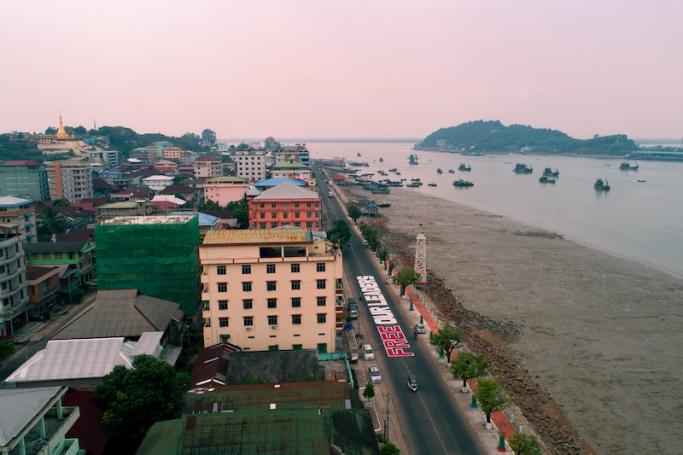According to Southern Monitor, the widespread conflict across Tanintharyi Region has caused serious socio-economic impacts on the population, according to the research group, Southern Monitor.
Increased junta troop reinforcements and offensives have disrupted the local populations ’housing conditions, health, security, livelihood and education.
Since the junta forces continued to commit some of the most visceral and obscene acts towards children and they are suffering in horrific situations where their security is not guaranteed and their basic rights are being denied.
Furthermore, the children’s rights to education has been put “on hold” as hundreds of thousands of children lack access to formal education and alternative methods of schooling due to the impacts of the 2021 coup.
While some children in urban settings with adequate internet access have been able to be part of online learning hubs supported by the National Unity Government (NUG) and other independent organisations, many children, especially those in rural settings and conflict-affected areas have been left behind in terms of access to education.
It is a difficult decision for parents to make, whether to send their children to state-run basic education schools despite their safety concerns.
Also, there have been several accounts of junta forces occupying schools and using them as barracks for soldiers. This increases the risks of violations against children and interferes with education.
Also, the junta’s restrictions on medical supplies have significantly strained access to healthcare services in Tanintharyi Region. Aid workers face severe shortages of medical supplies they urgently need to provide treatment to local populations and internally displaced populations in camp-like settings.
Junta forces have tried to arrest individuals who they suspect are providing medical treatment and supplies to the local PDFs. Those carrying or transporting medicines, food, and clothing in bulk have been interrogated and intimidated by the junta forces at the checkpoints along major highway roads.
The junta forces continue to enforce bans on the bulk transportation of dry rations (rice, instant noodle, etc) and medicines and other medical items (anticoagulant drugs, gauze,bandages, etc.).
A local aid worker also reported that the local PDFs have interrogated and intimidated aid workers who were transporting patients and assisting the bereaved families with funeral services in Palaw Township.
Both the junta forces and the local PDFs have restricted the use of the major roads from Myeik to Palaw and from Dawei to Hteekhee, which has disrupted the healthcare and funeral services provided by local aid organisations.
An increase in junta forces, security checks and their restrictions on food items have also continued to strain the livelihoods of the local populations across Tanintharyi Region, according to Southern Monitor.
The junta forces have established checkpoints to conduct security checks on vehicles and passengers and often demand money in the form of arbitrary taxation, meaning that local businessmen and traders are unable to make profits from their goods.
According to local betel nut farmers and traders, at each checkpoint along their route money is demanded for them to be allowed to transport their betel nuts.
In addition, Betel nut harvesting in the conflict-affected areas such as Wa Kone and nearby villages in Dawei District has had to be abandoned because of the intensification of fighting in the area.
The flow of goods in and out of Dawei Town to the region has also been restricted because junta troops are monitoring all the entrances and exits to the town.
As the state of emergency has continued, the severity of the socio-economic impacts have surged to unprecedented levels and Southern Monitor believes that the resistance movements face a looming threat of losing adequate support.
The local populations have been bearing the brunt of the severe socio-economic impacts of the 2021 coup as well as the increasing sense of insecurity bought on by the atrocities, threats and intimidation of the junta forces.
The woes of the economic crisis and soaring rates of unemployment will likely weaken the local populations ’support towards the revolution.
Southern Monitor believes there remains the need to address the socio-economic impacts of the coup such as lack of access to education and healthcare as well as protection of vulnerable groups, including women, children, and the internally displaced communities. The lack of access to formal education and alternative methods of schooling have become protracted with little hope for a solution.
The junta troops' strong presence, as well as the intensified clashes across the region, resulted in increased displacement of local populations in January 2023. Also, the junta’s widespread ban on the transport of relief items across all townships in the region, to curtail all the local PDFs ’access to supplies, have deprived displaced populations of adequate food, medicines, and shelter.
Local aid organisations ’endeavors to fulfill the needs of IDPs and the host communities have been largely and continuously hampered by restrictions and other acts by the junta forces that have involved confiscation of aid items in bulk (e.g. medicines, warm clothing, food), interrogation of local aid workers, threats, and intimidation.
As the local PDFs have also increasingly placed restrictions on the use of certain roads in the conflict areas, the local aid workers are facing additional threats on this front.
Southern Monitor says that both the junta and PDFs must allow unfettered humanitarian access to displaced populations.
As the current conflict trajectory features intensified armed clashes, civilian houses burnt down, the flight of thousands of people, and the loss of economic development and income, the junta’s efforts to project an image of Tanintharyi Region as a stable and prosperous region have been in vain.












